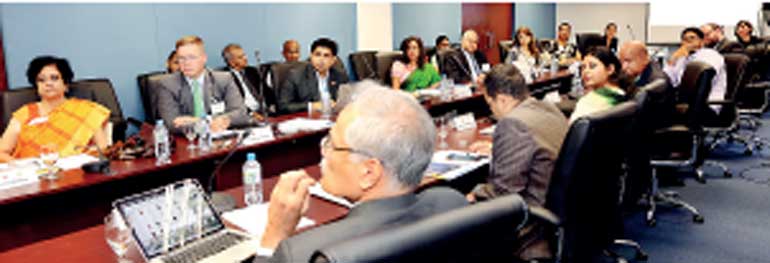Wednesday Feb 18, 2026
Wednesday Feb 18, 2026
Saturday, 16 September 2017 00:34 - - {{hitsCtrl.values.hits}}

 The Institute of National Security Studies of Sri Lanka (INSSSL) hosted its first strategic forum together with the Near East South Asian (NESA) Center for Strategic Studies at its premises from 6-7 September.
The Institute of National Security Studies of Sri Lanka (INSSSL) hosted its first strategic forum together with the Near East South Asian (NESA) Center for Strategic Studies at its premises from 6-7 September.
The forum addressed a prevalent topic common to South Asia, that of ‘Meeting the Challenges of Extremism by Advancing Human Security Centred Policies’. There were papers presented by academics from six South Asian countries, relevant to the challenges that have risen due to violent extremism.
This strategic forum was of great significance as it represented the convergence of intellectuals and experts to discuss a challenge that is endemic to the region. On an institutional level, this forum also represented the collaboration between INSSSL, the premier national security think tank under the Sri Lankan Ministry of Defence and NESA Center which is part of United States Department of Defence.
At the helm of this forum, Asanga Abeyagoonasekera, Director General of INSSSL and Dr. Roger Kangas, Academic Dean of the NESA Center guided the dialogue towards enhancing human security centred policies in the South Asian region. Such dialogue was supplemented by experts from academic, military and diplomatic backgrounds, who contributed their expertise and experiences to counter violent extremism in their respective countries.
The strategic forum was inaugurated with the opening remarks by Acting Secretary of Defence, R.P.R. Rajapaksa, underlining the importance of the forum as violent extremism is a problem that has escalated rapidly in recent years and it cannot be countered with aggression and military strength alone. The Director General of INSSSL stressed the need to take different actions to address different problems as there is no ‘one-size-fit-all formula’ for combatting extremism.
The session that followed highlighted the countering violent extremism (CVE) policies implemented in Afghanistan by both the states and civil society organisations. The main challenges ascertained were the lack of good governance, rule of law and corruption that represented impediments to countering extremism.
Radicalisation of youth was also bought up as a human security oriented challenge. The importance of the rule of law in purporting human centred policies against violent extremism was also underscored. Intra-state and inter-state communal violence were attributed to South Asia’s colonialist past and speakers emphasised the need to address this issue that has prevailed till today. It was apparent that the true cost of extremism and its spillover effects are being borne by the Indian and Pakistani peoples.
The issue of terrorism and thereby radicalisation of youth in Bangladesh was also highlighted as a challenge. Furthermore, the influx of Rohinga Muslims into the country has proven to be a key human security dilemma.
The underlying theme common to South Asia is the fact that there is little understanding of the concept of human security itself which was underscored from the Sri Lankan perspective. On the other hand, an expert from Nepal sought to explain how human security is incorporated in dealing with natural disasters, especially given that Nepal as well as the wider region of South Asia is prone to such calamities.
Speakers from the aforementioned countries provided their perspective on countering extremism through human security in their respective countries. Thus, the forum built on the foundation of the need to advance human centred policies especially in South Asia, where orientation around securitising the individual or collectives is not integrated into the governing structure.
Speakers from Pakistan, Sri Lanka and the Dean of the NESA Center provided insights into their country perspectives of CVE at the concluding session. Radicalisation and extremism in the Federally Administered Tribal Areas (FATA) in Pakistan which are home to many militant groups was a point of interest for many which also led an engaging discussion. The presentation from Sri Lanka explored the interesting fact that human security has always been part of State policy since historical times.
In the concluding session, organisers of the forum summed up proceedings and discussed the way ahead following on from this event. Establishing a network of South Asian experts to make regular contributions on regional security perspectives marked the successful conclusion of the event. The convening of the best minds in such forums is important towards producing recommendations for policy makers.